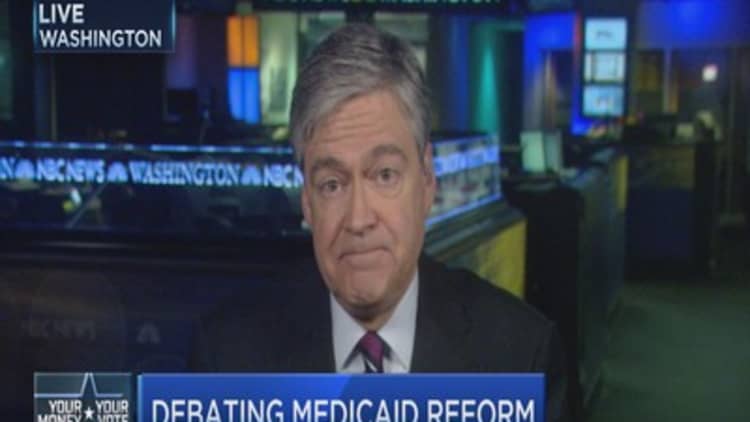
Of the two landmark health-policy achievements of Democratic President Lyndon B. Johnson, Medicaid has always been more vulnerable than Medicare to Republican attacks.
As a universal national program for retirees, Medicare enjoys broad support within both parties even though conservative icon Ronald Reagan fought its creation in the 1960s. As a joint federal-state program serving the poor — a Democratic-leaning constituency — Medicaid stands on narrower, shakier ground.
That's especially true in the 2016 Republican presidential race.
Many Republicans support House Budget Committee Chairman Paul Ryan's idea to convert Medicaid from an open-ended entitlement to a fixed block-grant to states to provide health care for the poor. At least one candidate expected to be on stage for the CNBC debate on the economy does not: Real estate magnate Donald Trump, currently leading national polls, vows to expand economic growth enough that cuts in Medicaid will be unnecessary.
But a second aspect of the Medicaid debate roils the Republican nomination fight even more. As part of President Barack Obama's 2010 national health-care law, the federal government promised to cover 100 percent of the cost for three years of expanding Medicaid to families earning up to 138 percent of the poverty level. Through 2012, Washington agreed to cover 90 percent of the cost
That left Republican governors — several of whom later joined the 2016 field — with a choice: expand Medicaid and risk the wrath of conservatives, or refuse to and pass up federal cash they could spend on their constituents
.Govs. Bobby Jindal of Louisiana, Rick Perry of Texas and Scott Walker of Wisconsin said no; Perry and Walker have since dropped out of the race.
Govs. Chris Christie of New Jersey and John Kasich of Ohio said yes. Now they face criticism from Jeb Bush, who had left the Florida governorship when the Affordable Care Act passed.
Bush says no governor should have expanded Medicaid unless Washington granted free rein to overhaul the program. If he's elected, he promises to grant governors that authority.
The governors who did expand Medicaid vigorously defend their actions — on fiscal and moral grounds.
Because of New Jersey's existing Medicaid regulations, Christie said, the state actually profited financially from the expansion.
Kasich said Ohio's ability to treat residents with mental illness under the expansion has reduced crime and prison costs. He also cites the biblical imperative to assist the poor.
Don't be surprised if it adds up to a vigorous debate on CNBC in Boulder on Oct. 28.



